23 Evidence-Based Benefits of Carrots
Carrots are regarded as one of the healthiest foods out there.
Back in the day, when we were still kids, our parents used to tell us to eat carrots because they are good for our health, particularly for the eyes.
However, it is still unknown how these root vegetables can be that good for your health.
We will try to list all health benefits of carrots and explain in detail their effects on our well-being. Stay tuned!
Carrots History
Carrots are believed to have originated in the modern Afghanistan 5000 years ago, which is still the area of dozens of wild carrots varieties.
In the early history of the vegetable, only the top greens were used for consumption, while the seeds were served as herbs.
Back then, carrots could be found in purple, red, black and white, but not orange.
Eventually, the ancient world including Egypt was overwhelmed with carrots.
There are even art depictions in pharaoh tombs in ancient Egypt suggesting that these carrots were of the purple variety.
Ancient Greeks and Romans also used carrots for different purposes.
The Greeks used them for medical purposes, whereas the Romans predominantly consumed carrots both cooked and raw.
Like many other vegetables, carrots were believed to possess aphrodisiac qualities.
By the 13th century, carrots were cultivated throughout Europe.
By the 16th century, the red and yellow carrots growing in England and purple and red varieties growing in France were well-known.
Thanks to the Dutch botanists who crossbred the yellow and red varieties to obtain the orange variety, we have a carrot as we know it today.
They wanted to obtain the orange varieties as it proved to have a much more pleasant taste, which was the gateway for the acceptance of carrots throughout the globe.
Carrots got to the United States in 1609.
However, it took 300 years for them to become popular in the US.
Namely, soldiers returning from World War I brought them from Europe where they developed a taste for the vegetable.
In 2011, over 35 million tons of carrots and turnips were produced around the world with China producing almost half of that.
The US produced approximately 1.3 tons in 2011.
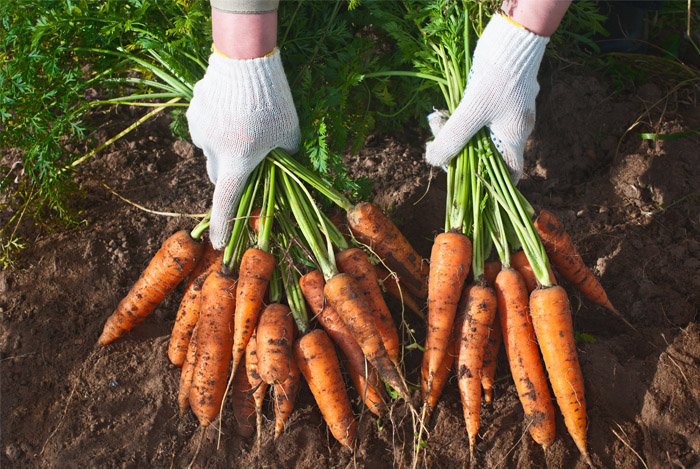
How It Grows
Daucus carota, also known as carrot, is a biennial plant, meaning it takes two years to grow completely.
It grows in the form of a rosette of leaves during the spring and summer.
Throughout its lifecycle, the plant stores large amounts of sugar in order to preserve enough energy for flowering in the second year.
The plant is a root vegetable, typically of orange color, and available in a variety of colors, as well.
The taproot is consumed primarily, but the green part is also edible and used in various recipes.
Varieties
Carrots can loosely be separated into “western” and “eastern” types.
The western types of carrots originate from the orange carrot bred in the Netherlands approximately 500 years ago.
Western types are generally divided by their root shapes into Danvers, Chantenay, Imperator, and Nantes varieties.
The eastern types of carrots are a closer descendant of the original carrot domesticated in Persia over 1,000 years ago and are usually yellow or purple.
The following types are some of the most common ones available in the United States.
Baby carrots
The name of this variety can be kind of misleading, but in reality, baby carrots are fully grown specimens but small in size.
Those that are not fully mature are not that tasty and are not worth eating.
Also, if you come across “baby” carrots in a supermarket, rest assured those are not baby carrots but just small pieces of normal carrots chopped to resemble baby carrots.
Chantenay
It is one of the four major sub-types of western carrots.
These are fat, short, and broad at the shoulder, tapering to a rounded blunt tip.
The core is a pale orange color.
They are most often used in processing for their ability to store well.
Red Cored Chantenay and Carson Hybrid are two common cultivars.
Danvers
This variety was developed in 1871 in Danvers, Mass, and is another of the four major sub-types of western carrots.
Shorter than Imperator but longer than Chantenay carrots. Most cultivars have “Danvers” in their name.
Imperator
The Imperator also belongs to the four major sub-types of western carrots and is the most commercially cultivated type.
This type is slender with a pointed tip and is also rich in sugar.
Cultivars include Imperator 58 and Sugarsnax Hybrid.
Nantes
Also belonging to the western carrot type, Nantes carrots are shorter and with a blunter tip compared to Imperator carrots.
These are also very high in sugar, brittle, and store less well compared to the other types.
Cultivars include Sweetness Hybrid, Nelson Hybrid, and Scarlet Nantes.
Purple Carrots
Purple carrots come in different color varieties ranging from dark violet to reddish purple.
They can have a peppery, sometimes intensely sweet flavor.
Cultivars include Purple Haze, Purple Dragon, and Cosmic Purple.
Red Carrots
This type is known for high lycopene content.
These are a pinkish red to purplish red outside layer with a core of pink to orange.
Beta-Sweet is a cultivar and a cross between eastern and western carrots.
Cultivars of red carrots include Atomic Red, Red Samurai, and Beta-Sweet.
Round Carrots
In terms of size and shape, these are similar to radishes.
In terms of flavor, these orange carrots taste like regular carrots.
These are also perfect for home growing because they do well in most soil types.
White Carrots
These are thin in size, mild and sweet in flavor, and, of course, white in color.
Cultivars include Lunar White, Snow White, and White Satin.
Yellow Carrots
These are often sweeter than the orange varieties.
They are completely light yellow.
They have a crunchy but firm texture and have been described as tasting somewhat similar to parsley and celery.
Cultivars include Solar Yellow, Amarillo, Yellowstone, and Sunlite.

Interesting Facts
Due to their long history, carrots have a long list of interesting facts. Here are some of them:
- In the 16th century, in honor of the House of Orange, the Dutch Royal Family, Dutch carrot growers invented the orange carrot. This was done by cross-breeding red carrots with and pale yellow carrots.
- The orange color of carrots comes from beta-carotene. Carrots are about 87% water.
- Overeating carrots can cause turning a person’s skin yellowish orange, particularly on the palms or soles of the feet. This condition is called carotenemia. This can be completely reversed by reducing the consumption of carrots.
- The longest carrot ever recorded was nearly 17 feet long.
- The largest carrot ever recorded weight was nearly 20.000 pounds.
- There are over 100 species of edible carrots today.
- Carrots lost their dryness, the bitterness of the core and gained sweetness only during 17th and 18th century.
- Carrots are one of the vegetables with the highest sugar content in the world. The only beet is richer in sugar.
- American cuisine found carrots inappropriate for use for the longest time. Only after World War I, they became fond of it.
- One teaspoon can hold 2000 carrot seeds.
- Carrot leaves were once used as a fashion statement, particularly in England during the 17th century.
- One ordinary person consumes 10,866 carrots in their lifetime.
- Due to their sugar content, carrots can be distilled and turned into alcohol.
- Wild rabbits do not eat wild carrots.
- One glass of milk contains the same amount of calcium as in 9 carrots.
- Ancient Greeks called Carrots Karoto and Philtron. The Japanese called them “ninjin”, and the Celts called them “honey underground”.
- First canned food contained carrots.
The city of Holtville in California is often called “The Carrot Capital of the World”.
Here, they have an annual carrot festival that has been celebrated for more than 60 years.
Nutritional Facts
As we said, carrots are very rich in many nutrients that are essential for your well-being.
To begin with, carrots are packed with water content, which can vary from around 86-95%.
On the other hand, the edible portion consists of around 10% carbohydrates (1, 2).
Though very rich in water, carrots cannot boast of fat and protein content.
Very little of these two can be found in carrots.
Carrots are also a great source of fiber and beta-carotene, as well as antioxidant agents (4).
Moreover, carrots are packed with vitamin A, vitamin C, vitamin K, vitamin B8, potassium, iron, manganese, copper, folate, and pantothenic acid.
One medium, raw carrot (61 g) contains 25 calories, with only 4 grams of digestible carbohydrates.
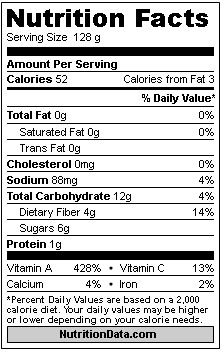
23 Health Benefits of Carrots
A great deal of evidence has been found suggesting that increased intake of antioxidant-rich fruits and vegetables decreases the risk of cancer and cardiovascular disease, carrots included.
Here is our list of nutrients and organic compounds found in carrots that improve your overall health.

Carrots Decrease the Risk of Cancer
Carrots have immense power when it comes to dealing with cancer.
According to the American Institute for Cancer Research, beta-carotene found in carrots is proved to protect cell membranes from oxidative stress, including inhibiting the growth of cancer cells (4).
What’s more, another compound found carrots called falcarinol is proved to slow the development of cancerous lesion when fed to rats (5).
Namely, diets that are high in carotenes have been linked to the reduced risk of several cancers, including colon cancer, prostate cancer, stomach cancer, and esophageal cancer, (4, 5, 6, 7, 8).
Also, women that consume large amounts of carotenoids on a regular basis may also have a decreased risk of breast cancer (8).
Also, older research found that carotenoids in carrots are effective in treating lung cancer, but newer studies found no protective effect (12, 13).
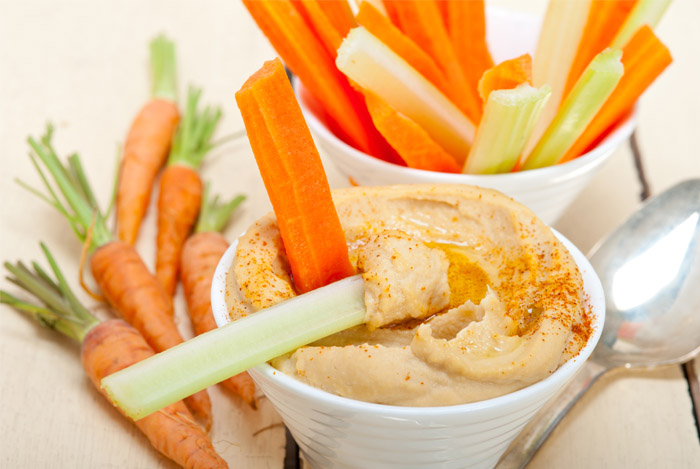
Carrots Lower Blood Cholesterol
Carrots are a good source of soluble dietary fiber.
These have been shown to lower cholesterol levels, which is essential for reducing the risk of heart disease (14, 15).
Fiber lowers blood cholesterol levels by binding to bile acids, which are made of cholesterol, in the gastrointestinal tract and getting them out of your body as waste, according to the University of Arizona College of Agriculture & Life Sciences (16).
In a three-week study, participants who ate carrots on a daily basis were found to have altered cholesterol absorption and increased antioxidant action due to carrot consumption.
Based on these findings, it is suggested that those with increased cholesterol levels might benefit from incorporating carrots into their daily diet (17).
In fact, according to the USDA, consuming two carrots a day may lower cholesterol by up to 20%, thereby bringing cholesterol to optimum levels.

Carrots Encourage Weight Loss
Carrots are such a good diet food because they are low in calories.
A cup of raw carrot has only 50 calories.
On the other hand, boiled carrots are slightly higher, with 54 calories per cup.
Carrots can promote satiety and decrease calorie intake in subsequent meals.
According to a study conducted by the British Journal of Nutrition in 2006, vegetables such as carrots that are high in fiber content increase satiety and decrease food intake overall (18).
If you are trying to lose weight, you might want to consider carrots as these are a useful addition to an effective weight loss diet.
Carrots Improve Vision
Carrots are perhaps best known for their ability to improve eyesight.
Therefore, there certainly is some truth in that carrots are good for your eyes.
Deficiency of vitamin A can lead to difficulties seeing in dim light.
Therefore, those lacking this vitamin can experience night blindness.
Fortunately, eating foods rich in vitamin A or carotenoids may improve this condition (19).
Namely, beta-carotene, a compound found in carrots, is converted into vitamin A in the liver.
Subsequently, vitamin A is transformed in the retina to rhodopsin, a purple pigment essential for night vision (20).
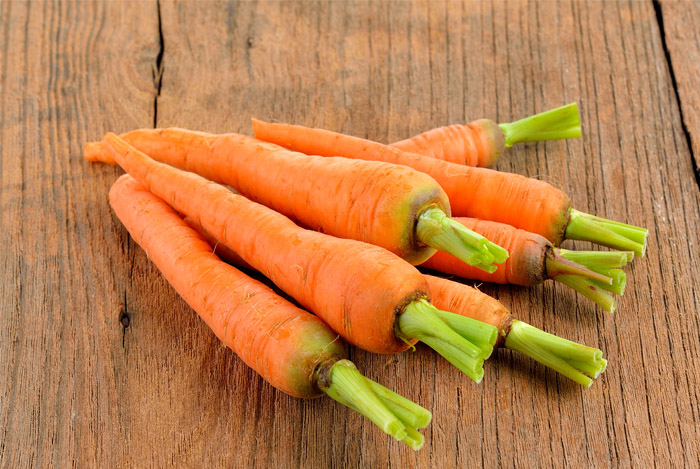
Carrots Prevent Macular Degeneration
Macular degeneration is a common eye disease of the elderly.
In order to slow down or even prevent the disease, it is recommended to increase the intake of carotenoids, particularly beta-carotene, which was found to reduce the risk of macular degeneration by 40% (21).
There are numerous studies suggesting the link between carotenoid intake and the reduced risk of age-related macular degeneration (22, 23, 24).
Beta-carotene is also capable of splitting itself via an enzymatic reaction to form provitamin A.
As we said, vitamin A deficiency is associated with vision, and the antioxidant capacity of the vitamin is known as an all-around vision booster.

Carrots Prevent Heart Disease
High cholesterol is one of the main factors for heart disease.
We have already explained how carrots reduce cholesterol levels, and by reducing them, you also decrease the risk of and prevent heart-related problems.
Carrots do not only contain beta-carotene, but they are also packed with alpha-carotene and lutein.
These are also very helpful when it comes to reducing cholesterol levels because soluble fibers in carrots bind with bile acids.
According to a study conducted at the Mario Negri Institute of Pharmacological Research in Italy, the participants who ate more carrots had 33% reduced risk of having a heart attack compared to those who ate fewer carrots (25).
Moreover, a study conducted by the American Journal of Clinical Nutrition in 2006 suggested that diets rich in carotenoids are associated with decreased risk of heart disease (26).
In 2011, the British Journal of Nutrition conducted a study suggesting that deep-orange-colored fruits and vegetables may reduce the risk of coronary heart disease.
In particular, carrots have been found to lower the risk of CHD by 32% (27).
Fortunately for women, carrots have been associated with lowering their risk of heart attacks.
The objective was to examine the relationship between certain foods and myocardial infarction in women.
The results suggest that specific foods including carrots have the ability to promote lower risks of heart attacks in women (28).

Carrots Lower Blood Pressure
When you are having trouble with your blood pressure, remember to eat a carrot because these are high in potassium.
Potassium is a vasodilator that relaxes the tension in your blood vessels and arteries, thus increasing blood flow and circulation, boosting organ function throughout your body and reducing the stress on the cardiovascular system.
Atherosclerosis, strokes, and heart attacks are a direct consequence of high blood pressure, therefore this health benefit is yet another heart-healthy aspect of carrots.
Also, coumarin, the compound found in carrots, has been associated with reducing hypertension and protecting your cardiovascular system.
Namely, at the Department of Physiology and Pharmacology in Karachi, Pakistan, they found that carrots are effective when used to treat hypertension.
The results indicate that carrots lower blood pressure due to their activity of unblocking calcium channels that are responsible for maintaining optimum blood pressure (29).
Carrots are Rich in Vitamin A
Carrots contain 426% of vitamin A of the RDA.
This is more than enough for those lacking this essential vitamin.
Carrots are high in beta-carotene, which is converted to vitamin A in your body.
Vitamin A improves eyesight, is important for growth, development and immune function (30).
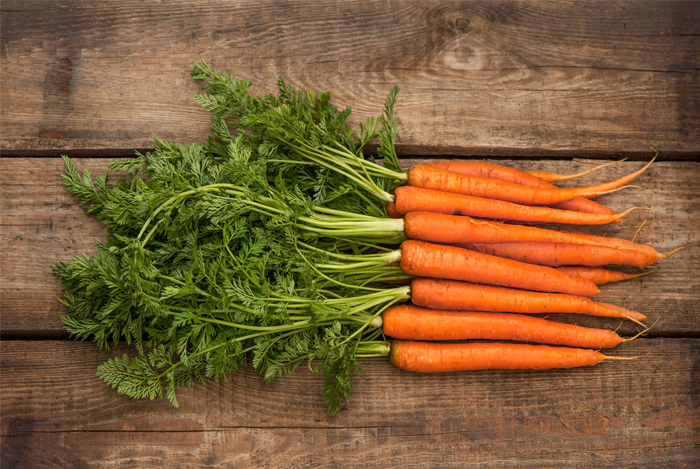
Carrots Boost Immunity
A well-functioning immune system is essential for overall health.
It enables our body to identify and fight off unwanted viruses, bacteria, and other potential threats to our body.
As for strengthening your immune system, vitamin A and vitamin D take center stage.
These particular vitamins have shown the ability to modulate immune responses and to prevent and treat inflammation and autoimmunity (31).
It stimulates the production and activity of white blood cells, which makes it a very important element in defending the body against diseases (32).
It is also responsible for regulating the release of immune cells in the gut.
According to a 2012 study conducted by Molecular Aspects of Medicine, vitamin A plays a key role in immune responses (33).
Carrots also contain small amounts of vitamin C, which plays an important role in boosting the immune system by stimulating the activity of white cells (34).
There are other immunity-boosting nutrients found in carrots such as vitamin B6 (5% RDV per large carrot), vitamin E (2%), and copper (2%).

Carrots are Rich in Dietary Fiber
You have probably been told to eat more fiber at least once.
Unfortunately, most Americans do not get enough fiber in spite of its numerous health benefits, especially on digestion.
Dietary fiber provides many health benefits, including a lower risk of heart disease, hypertension, stroke, obesity, certain gastrointestinal disease and many others.
Fiber also eliminates excess LDL cholesterol from the walls of blood vessels and arteries (35).

Carrots Improve Digestion
Like most vegetables, carrots have a significant amount of dietary fiber in the orange roots.
Fiber is an element that maintains good digestive health by keeping you regular, boosting good bacteria, and controlling hunger (36).
Also, fiber adds bulk to stool, which enables it for food to pass smoothly through the digestive tract.
Moreover, it promotes peristaltic motion and the secretion of gastric juices.
By improving all of this, you will not be experiencing the symptoms of conditions like constipation.
According to the findings of the Department of Pediatrics at the University of Michigan, foods rich in fiber such as carrots are found to increase the frequency of bowel movements, which is a considerable benefit when it comes to treating constipation (37).
By preventing constipation, carrots will protect your colon and stomach from numerous illnesses, including colorectal cancer.

Carrots Preserve Oral Health
Saliva is an alkaline substance that fights the bacteria and foreign bodies that often cause halitosis, cavities, and other oral health risks.
That is why carrots will clean your teeth and mouth.
The organic compounds found in carrots are vital for oral health by increasing saliva production, stimulating gums and decreasing the risk of cavities.
These compounds help in scraping off plaque, food particles and stains from teeth if eaten after meals.
Also, after consuming carrots, the fiber found in them boosts your immunity by acting as a natural digestive system brush, by getting rid of unwanted bacteria in the gut and by promoting improved digestion of immune-boosting nutrients.
Certain minerals found in carrots have the antibacterial properties that help in preventing cavities and tooth decay.
According to a 1994 study conducted by the Journal of Applied Bacteriology, the antimicrobial properties of fresh carrots may inhibit spoilage bacteria (38).

Carrots Reduce the Risk of Stroke
Regular consumption of carrots significantly reduces the risk of stroke.
Eating just one carrot a day will decrease your risk of stroke by 68% (39).
Numerous studies have been working on strengthening the belief of the positive effects of carrots on your brain.
These studies suggest that stroke patients who consumed the highest levels of beta-carotene had the highest survival rate.
More thorough research on the relation between carrots and stroke has been conducted at Harvard University.
They conducted a study showing that eating carrots five times a week or more can decrease the risk of stroke significantly by two-thirds, compared with eating carrots only once a month or less.
Moreover, they noted that other foods high in beta-carotene, besides carrots, are orange colored vegetables and fruits and dark green leafy vegetables such as oranges, papayas, melon, mangoes, spinach, pumpkin, sweet potatoes, and tomatoes.
Also, the study remarks fresh and outdoor exercise, and a proper diet as three factors that will prevent the occurrence of further strokes.
Carrots Reduce the Risk of Type 2 Diabetes
Carrots are of great help when it comes to regulating blood sugar levels due to the presence of carotenoids found in this awesome vegetable (41).
Carotenoids inversely affect insulin resistance, thereby lowering blood sugar and helping diabetic patients in keeping sugar spikes at bay.
They also help in regulating the amount of glucose and insulin used and metabolized by the body, enabling a more even and healthy fluctuation for diabetic patients.
Researchers at Stanford University School of Medicine found that those with a genetic predisposition to type 2 diabetes may lower the risk of developing the condition by consuming beta-carotene (42).
The findings are promising though the research is not conclusive.
Yet, diabetic patients should consider carrots safe food.
Carrots fall under the “non-starchy vegetable” heading, thus being part of one of the few food groups that diabetic patients can safely consume, according to the American Diabetes Association (43).
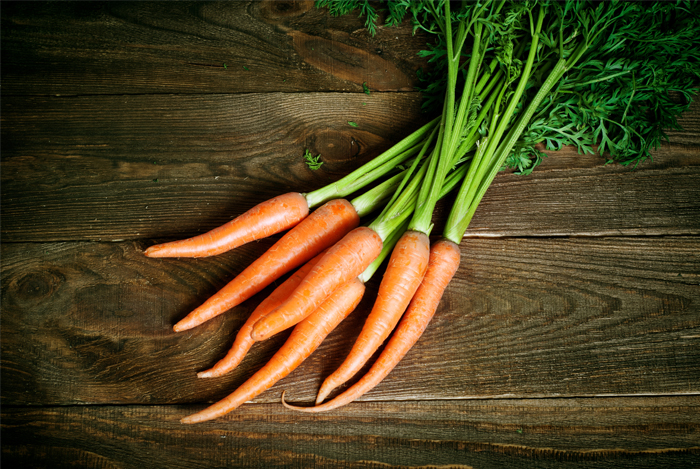
Carrots are a High Source of Antioxidants
Carotenoids, found in carrots and other orange vegetables, are potent antioxidants that help in reducing the risk of different forms of temporary illnesses and serious chronic diseases.
According to Nutrition in Clinical Care, dietary carotenoids are particularly helpful in decreasing the risk of certain cancers and eye disease (44).
Carrots and carrot juice bolster the immune system by helping to defend your body from free radical damage, viruses, harmful bacteria, and inflammation.
Carrots and carrot juice benefit from the following antioxidants: beta-carotene, vitamin C, lutein, lycopene, and zeaxanthin.
Carrots are among the highest natural sources of carotenoid phytochemicals and beta-carotene, both of which fight cancer by reducing inflammation levels, cell mutation, and DNA damage (45).
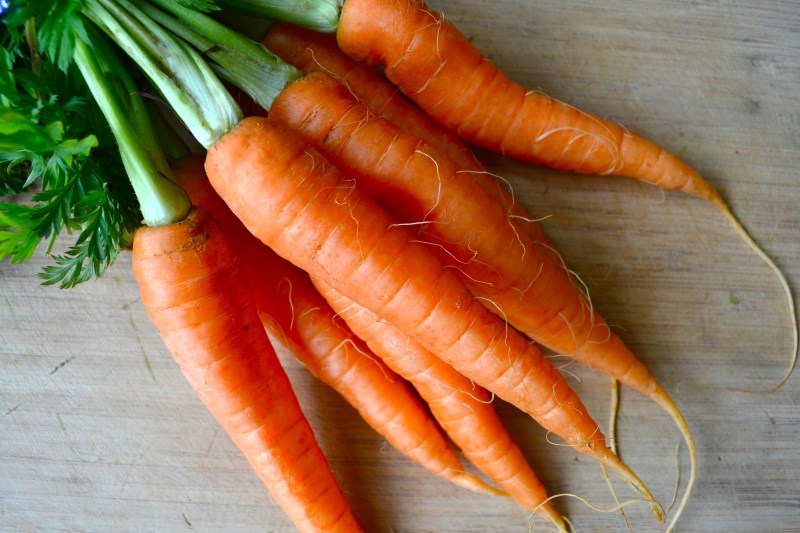
Carrots Reduce Inflammation
Chronic, low-level inflammation is one of the leading causes of death in the United States.
It is thought to be the root cause of heart disease, Alzheimer’s, cancer and arthritis.
The best thing about this is that you can combat and completely eliminate this low-level inflammation in the body by maintaining a proper, healthy diet.
Carrots are particularly a great anti-inflammatory food, maybe due to the presence of vitamin A in the vegetable, which is a vitamin with many anti-inflammatory properties.
Vitamin A deficiency has been associated with inflammation in the lungs, intestines, and skin, according to WebMD (46).
According to a 2002 study conducted by the Proceedings of the Nutrition Society, supplementing with vitamin A may help in treating several inflammatory conditions such as some acne, a lung condition called bronchopulmonary dysplasia and some forms of cancer (47).
Yet another research has been conducted on carrots and their anti-inflammatory properties.
Namely, carrot extract has the anti-inflammatory benefits that are more potent and completely harmless compared to anti-inflammatory drugs like Ibuprofen, Aspirin, Celebrex, and Naproxen (48).
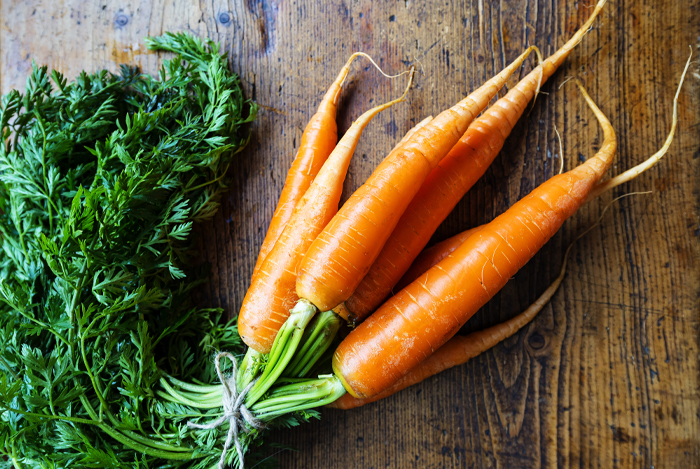
Carrots Boost Skin Health
High levels of vitamin A found in carrots may help you achieve that healthy, glowing skin you have always desired for.
Vitamin A is routinely used to treat skin conditions such as eczema, acne, cold sores, wounds, burns, psoriasis and even sunburn.
If your skin is rough and dry, you are probably not getting enough of vitamin A.
A 2011 study published in the Journal of Evolution and Human Behavior suggested that healthy diets high in foods like tomatoes and carrots will give you a healthier and more glowing skin than the sun (51).
Natural compounds called carotenoids are antioxidants that give your skin a red or yellow coloring, therefore are responsible for the “natural tan” (52).
Many people prefer eating orange and red foods for sunbathing.
However, you should know that you still need the sunshine because it provides your daily dose of vitamin D, which is vital both for your skin and overall health.
Carrots Heal Wounds
Certain carotenoids found in carrots are critical for healing wounds of any type.
Beta-carotene is particularly effective in helping healing wounds.
Thanks to this potent compound, carrots have been used for centuries as wound healing agents (53).
For that reason, if you have any type of cuts, skin infection, or other wounds, you might want to consider incorporating carrots or carrot juice into your diet, thereby reaping their skin benefits by increasing the ability to fight infection and other signs of skin infection and heal faster.

Carrots Boost Your Mood
Are you longing for less stress, more positive and happier life?
Try carrots.
According to a study from the Harvard School of Public Health, people who rated themselves as optimistic had 13% higher levels of carotenoids in their blood than those patients that rated themselves as less optimistic (54).
However, the results are still inconclusive and researchers are on their way to find the link between the consumption of carotenoids and optimism.
Perhaps it is because people who eat more fruits and vegetables usually follow a healthier lifestyle, which makes them more optimistic.
Despite the nature of your mood, make sure to add more carrots and other foods rich in carotenoids like kale, spinach, and sweet potatoes.
Not only will you feel more optimistic, but you will also improve mental health and cognitive function, according to a 2006 study (55).
However, this particular benefit will be covered later in the article.
Carrots Boost Bone Health
Surprisingly, carrots have the capacity to bolster your bones.
They contain small amounts of nutrients such as vitamin C (5 mg per 1 cup) and calcium (42.2 mg per 1 cup).
However, it is silicone that has been found to be important in bone formation, and carrots do contain this compound (56).
According to a 2002 study published in the American Journal of Clinical Nutrition, solid foods such as beans, carrots, and grains are a major source of available silicon and may boost bone health.
Nonetheless, this association between dietary silicon intake and bone health needs further evidence (57).
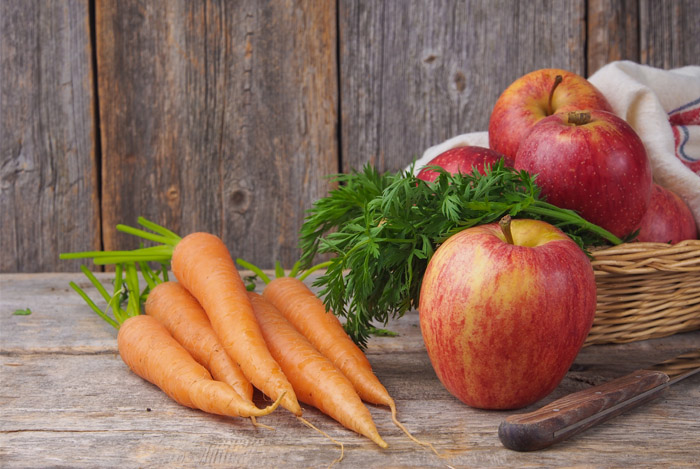
Carrots May Treat Leukemia
Overwhelming evidence suggests that eating fruits and vegetables with antioxidant properties leads to a decreased risk of different forms of cancer, including leukemia.
In 2011, the Journal of Medical Food published a study suggesting that carrot extracts can prevent the formation of leukemia cell lines.
The findings also suggest that carrots are a great source of bioactive chemicals essential for treating and inhibiting the progression of leukemia (58).
Carrots Boost Brain Health
Carrots and carrot juice are very helpful when it comes to improving your brain health function.
They assist in preventing disease like Alzheimer’s by improving memory and fighting off other varieties of cognitive dysfunction.
Namely, the Journal of Biochemical and Molecular Toxicology published a study suggesting that carrots have the ability to reduce oxidative stress in the brain that can weaken neuron function and its capacity to quickly respond to signals (59).

Carrots Offer Liver Protection
Both the antioxidants and fiber in carrots work to directly support your liver function.
Fiber increases bile secretion from the liver, thus helping prevent liver and gallbladder disease.
This ensures that the liver does not become overburdened.
It also reduces oxidative stress and inflammation throughout the body, including the liver.
In a rat study, beta-carotene has been found to help in preventing liver damage induced by alcohol (60).
What’s more, additional studies conducted on mice show that carrots may have protective properties for the liver from the effects of environmental chemicals and toxins – perhaps even those found in your non-stick cookware (61).
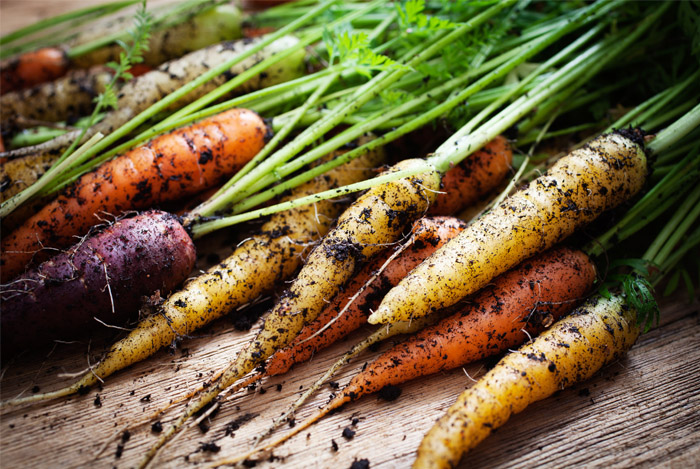
How to Buy and Store
The roots of carrots should be smooth, firm, relatively straight and bright in color.
The brighter the orange color, the more beta-carotene is present in the carrot.
Do not select carrots which are excessively forked or cracked, as well as those that are rubbery or limp.
In addition, if the carrot does not have its top attached, take a look at the stem and make sure that it is not dark in color as this is also a sign of age.
If the green top is attached, it should be bright in color, feathery and not wilted.
Since the sugar is concentrated in the carrot’s core, generally those carrots with larger diameters will have a larger core and therefore be sweeter.
Carrots are one of those vegetables that are hardy, meaning it can be kept longer compared to most other vegetables if stored properly.
In order to extend its shelf life and preserve the freshness of carrot roots, make sure to minimize the amount of moisture they lose.
You can do this by storing them in the coolest part of your refrigerator wrapped in a paper towel or put in a plastic bag, which will reduce the amount of condensation that is able to form.
Vegetables are prone to lose some nutrients.
However, if you store carrots properly, it is highly likely that the loss of nutrients – for example, vitamin C in carrots – will be significantly slowed down.
Carrots should be able to keep fresh for about two weeks.
Valuable (all-E)-beta-carotene isomer is well-retained if stored properly.
You should also store carrots away from other fruits and vegetables such as apples, pears, potatoes and such because these produce ethylene gas that causes carrots to become bitter.
If you buy carrot roots with attached green tops, you should cut off the tops prior to storing in the refrigerator as these pull moisture from the roots, causing them to wilt prematurely.
While you can store the tops in the refrigerator, keep them moisturized by wrapping them in a damp paper, you should really use them soon after purchase as they are fragile and will quickly begin to wilt.

How to Incorporate More in Your Diet
You can find carrots in supermarket year-round, but they are available locally during their bi-annual seasons in the spring and fall.
Carrots are a versatile vegetable and commonly eaten raw, boiled, steamed, roasted and as an ingredient in many stews and soups.
They can be bought fresh, canned, frozen or even pickled.
Wash carrots roots and use a vegetable brush right before eating to make sure you have scrubbed them properly.
Unless the carrots are thick, old or not grown organically, peeling, in that case, is not necessary.
If the stem end is green in color, you should cut it away since it is bitter in taste.
Depending on the recipe of your own preference, you can leave carrots whole or grated, julienned, shredded or sliced into rounds or sticks.
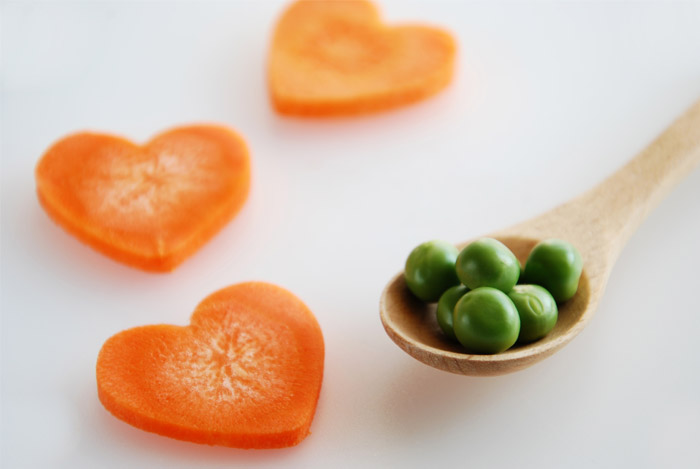
Precautions
The benefits of carrots are numerous.
There is no doubt about it.
But it seems ironic that you can get sick from eating carrots.
But, actually, you can.
Some people are allergic to carrots, which may cause certain side effects, though these allergic reactions are more often associated with foods such as nuts and shellfish.
However, taking a few precautions may help in minimizing the downside of carrot consumption.
Allergies to Carrots
Food allergies belong to the group of food sensitivities.
They occur when your immune system reacts to certain proteins in food.
For example, if you are allergic to carrots, the first time you eat them, your body, that is, your immune system creates antibodies called immunoglobulin E, also known as IgE.
Your body then releases IgE, which can cause reactions such as hives itching, stomach upset or difficulty breathing.
Carotenemia
If you consume too much carotene, then you might experience a slight change in your skin color as a result of the increased pigment in your blood.
It may turn slightly orange/yellow.
Nonetheless, this condition is not harmful to your health and is more of a shock to your eyes than to your body.
Too Much Vitamin A
If you consume too much vitamin A, it can be toxic to your body.
However, this usually occurs when an individual overdoses on vitamin A supplements and not by dieting.
Diabetics
If you are diabetic, be cautious of your carrot intake when juicing, since carrots have higher sugar content than other vegetables.
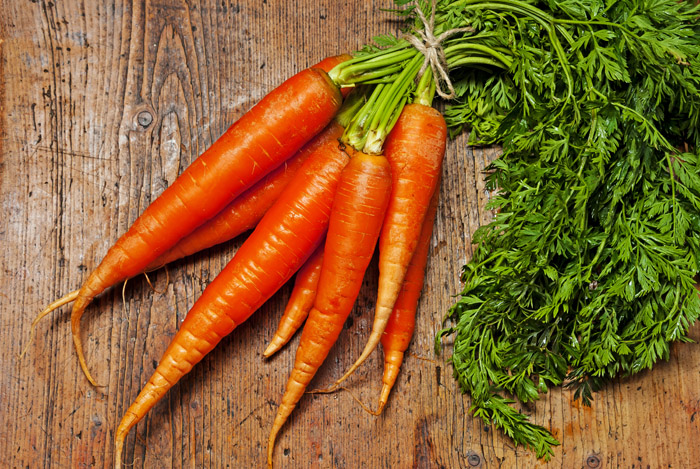
Conclusion
Carrots are perfect when it comes to their nutritional profile.
These are low in calories, full of nutrients, crunchy, taste sweet and serve as the perfect snack.
They have been associated with a great number of benefits including, cardiovascular, vision, treating cancer, improved digestion, skin ones.
There are a few types of carrots that come in different sizes, shapes, and colors, all of which are great additions to a healthy, balanced diet rich in fiber, vitamins, and beta-carotene.
FDA Compliance
The information on this website has not been evaluated by the Food & Drug Administration or any other medical body. We do not aim to diagnose, treat, cure or prevent any illness or disease. Information is shared for educational purposes only. You must consult your doctor before acting on any content on this website, especially if you are pregnant, nursing, taking medication, or have a medical condition.
HOW WOULD YOU RATE THIS ARTICLE?
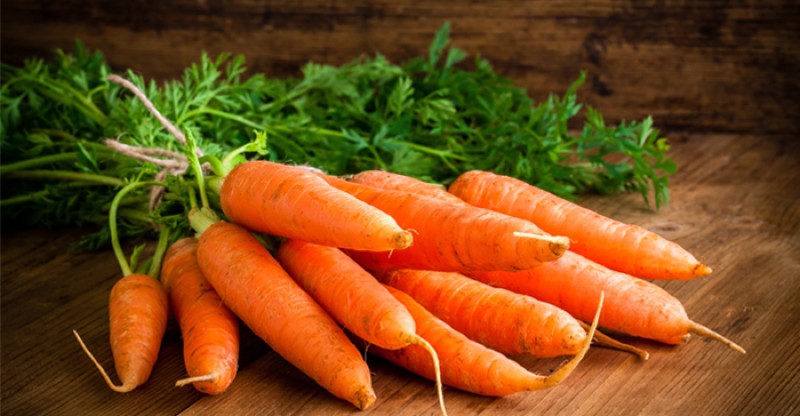






Are all varieties of carrots equally beneficial for health?
Do carrots help with diabetes type 1?
Do marinated carrots keep the benefits?